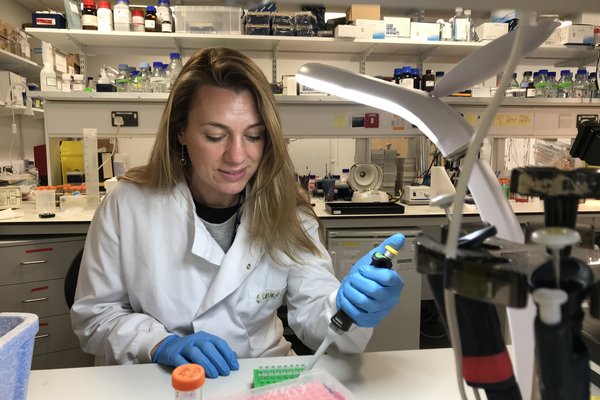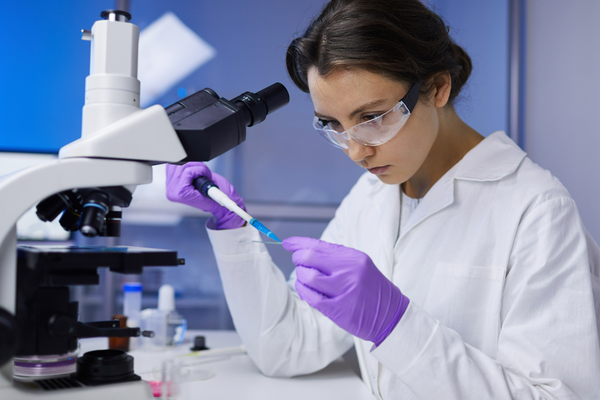
Preventing chemotherapy resistance in ovarian cancer
Most womb cancer starts in the lining of the uterus (womb). Around 9,700 women are diagnosed with womb cancer each year in the UK. The most common symptom is unusual bleeding from the vagina.

Most womb cancer starts within the lining of the womb (called the endometrium). The lining of the womb is shed every month in women and people who have periods. The womb is an organ in the pelvis which is where a baby grows during pregnancy. Most womb cancers occur when cells lining the womb start behaving abnormally and grow uncontrollably.
There are two main types of womb cancer defined by where the cancer starts:
Most womb cancers usually start in the endometrium and womb cancer is sometimes referred to as ‘endometrial cancer’. There are a few different types of endometrial cancer, some more common and some rarer.
Uterine sarcomas are much rarer and require different treatments to endometrial cancers. If you’d like to know more about these cancers see Cancer Research UK’s pages.
Womb cancer is the fourth most common cancer in women in the UK. Around 9,700 women are diagnosed with womb cancer each year.
It’s not always clear why someone gets womb cancer. Having a high level of a hormone called oestrogen, without adequate balance of another hormone called progesterone, can increase your risk.
You may have unbalanced oestrogen if you:
You might also be more likely to get womb cancer if you have:
The most common symptom of womb cancer is bleeding from the vagina that is unusual for you. This might be:
Other symptoms of womb cancer include:
Your symptoms might not be womb cancer and there are many other conditions that cause similar symptoms. One in 10 people who have bleeding after the menopause have womb cancer so it’s important to get checked by your GP. Finding womb cancer early makes it easier to treat.
Your doctor will ask you some questions about your symptoms. It’s a good idea to keep notes about your symptoms and take these with you to any GP or hospital appointments.
They may also want to do a physical examination which could involve:
Your GP may send you for an ultrasound scan. If this shows that the lining of the womb is thickened, you will need to see a gynaecological specialist to have a sample (biopsy) taken from the lining of the womb. You may want someone to go with you to your appointment for support.
The NHS has information about what tests you may have.
There are a few different treatments for womb cancer. It will depend on the type of the cancer and if it’s spread.
Surgery, radiotherapy, chemotherapy and immunotherapy are the main treatments.
Most womb cancers are found at an early stage and can be treated with surgery to remove the womb – this is called a hysterectomy. This means you are no longer able to get pregnant. It often involves removing the ovaries and fallopian tubes too.
Some types of womb cancer can respond well to hormone treatment. If you are at very high risk for an anaesthetic/surgery, this may allow time for other treatments to improve your risks before going ahead with an operation, for example, treatment to help you lose weight.
In young women with the type of cancer that can respond well to hormone treatment, it may be possible to treat the cancer with hormones first. This may mean you can delay surgery and allow time to have a baby in the future. Ask your doctor if this is something you would consider.
It’s normal to fear cancer coming back after treatment. If you spot any symptoms, speak to your GP. The symptoms do not necessarily mean the cancer is back.
You may find speaking to other women who’ve experienced womb cancer helpful.
You can find out more information about womb cancer on the NHS website.
The charity Peaches Womb Cancer Trust provides support and information for those with and at risk of womb cancer. Go Girls supports women, men, trans people and non-binary people diagnosed with gynaecological cancer.
The charity The Eve Appeal has a guide for women about womb cancer. It also runs a nurse-led helpline and email support service, called Ask Eve.
Womb Cancer Support UK runs a private Facebook group for women affected by womb cancer.
You can also watch our webinar on gynaecological cancers. Dr Sarah Kitson, an expert in gynaecological cancers, discusses the most common symptoms of the five gynaecological cancers: cervical; ovarian; vulval; vaginal; and womb cancer She also explains who may be most at risk and the impact a diagnosis can have.
Let's Talk Gynaecological Cancers
Watch our webinar with top experts answering common questions about the five gynaecological cancers, including vaginal cancer.As a women’s health charity, part of what we do is fund research to save and change the lives of women, girls and babies.







The vulva is the external part of the female genitals. Cancer in this area can cause a lump that may be sore or bleeding. There are 1,400 new cases in the UK every year.

Endometriosis happens when tissue similar to the lining of the womb grows in other places. It can cause chronic pain, heavy periods and other symptoms affecting your everyday life. With the right treatment, it can be made more manageable.

Fibroids are non-cancerous growths that develop in and around the womb. They can cause heavy periods and other symptoms, such as pressure and pain. There are treatments to help.